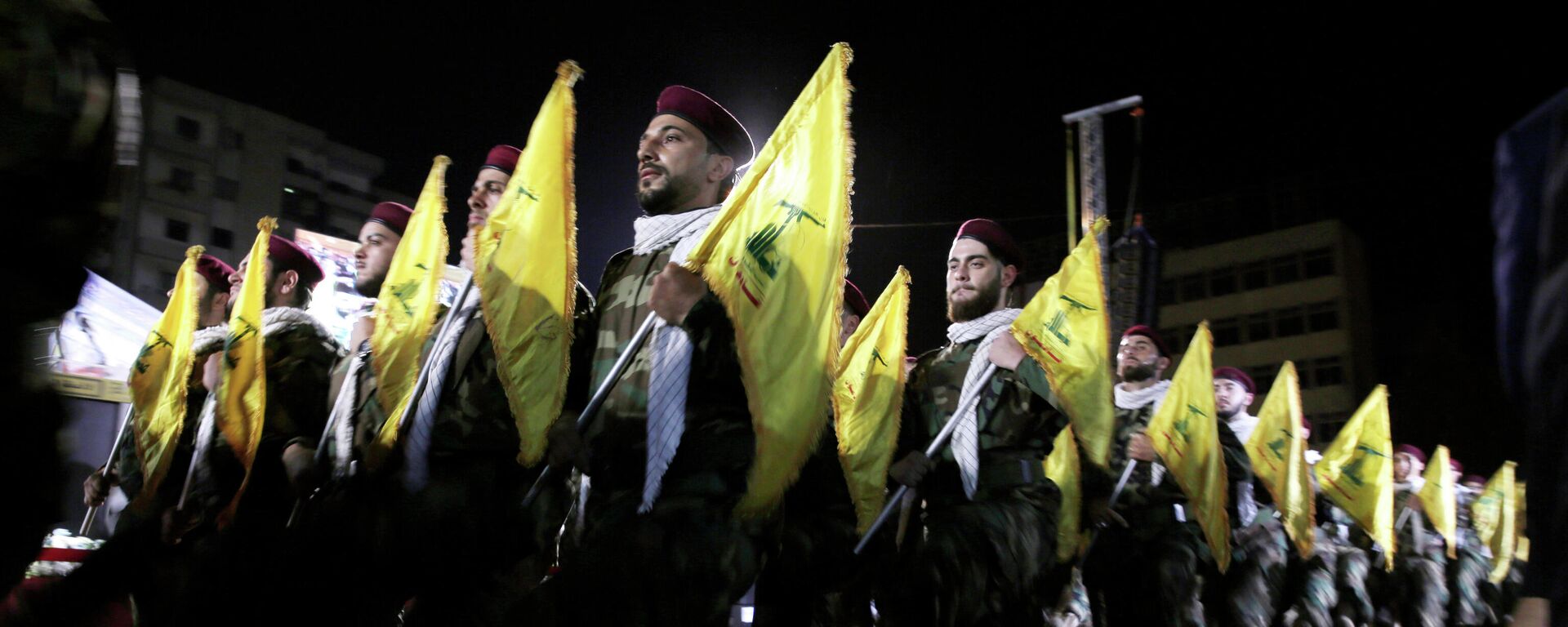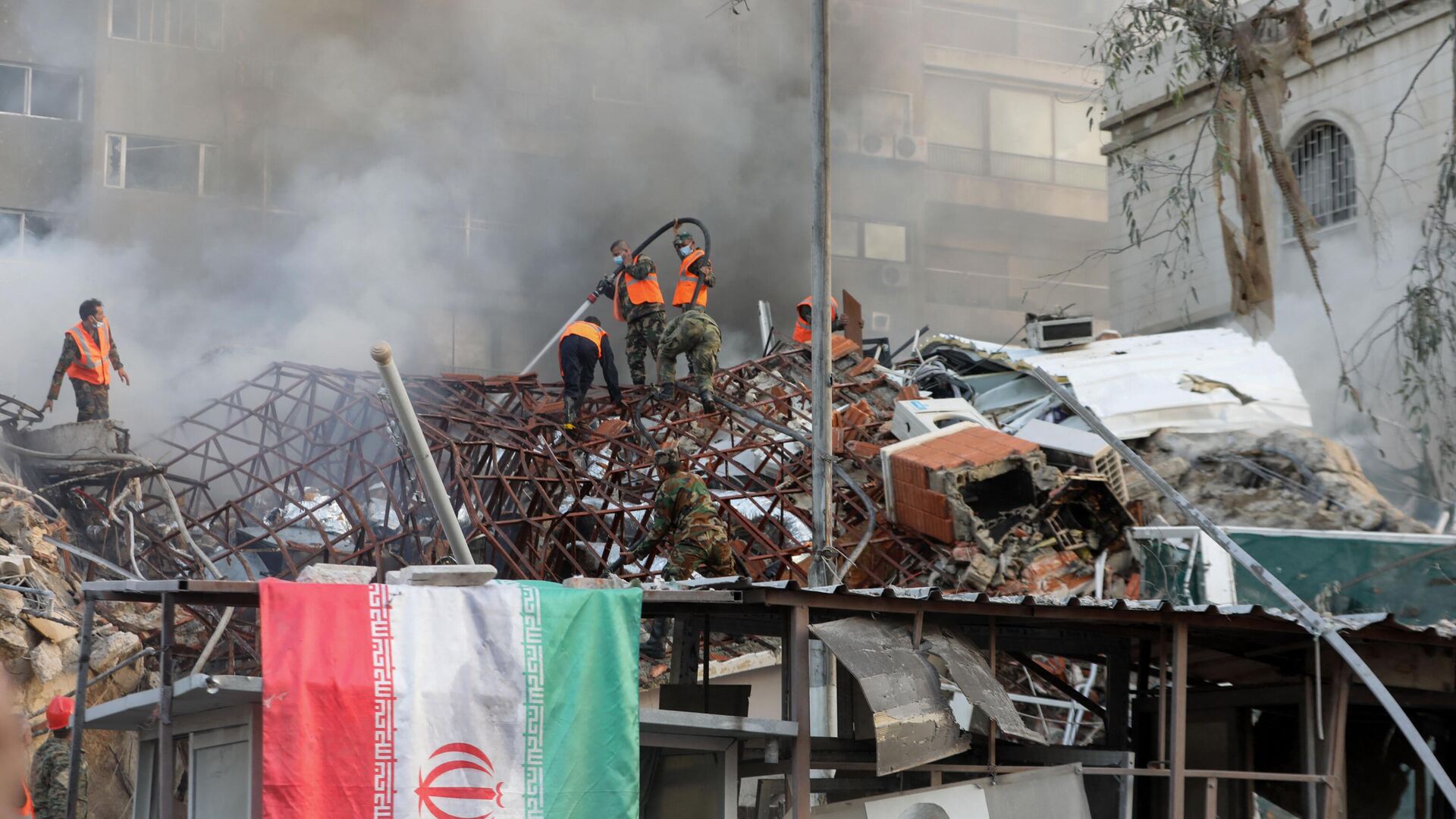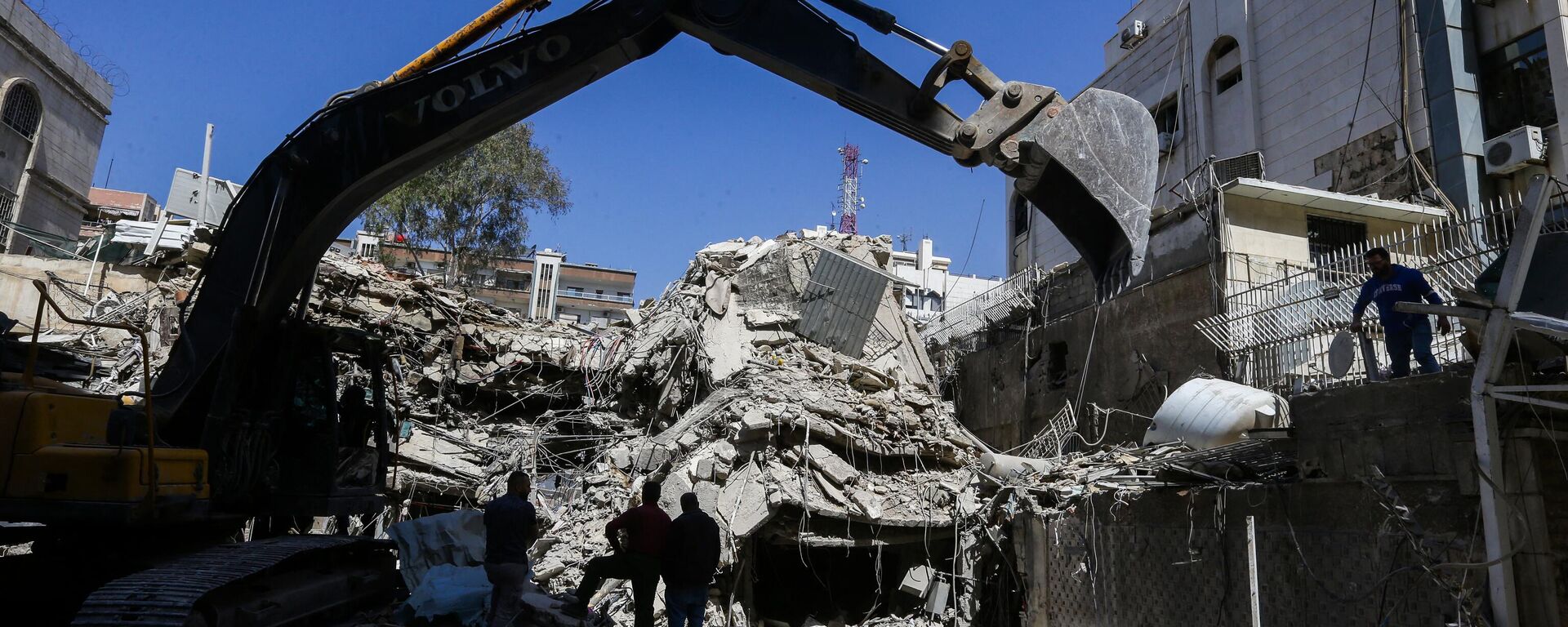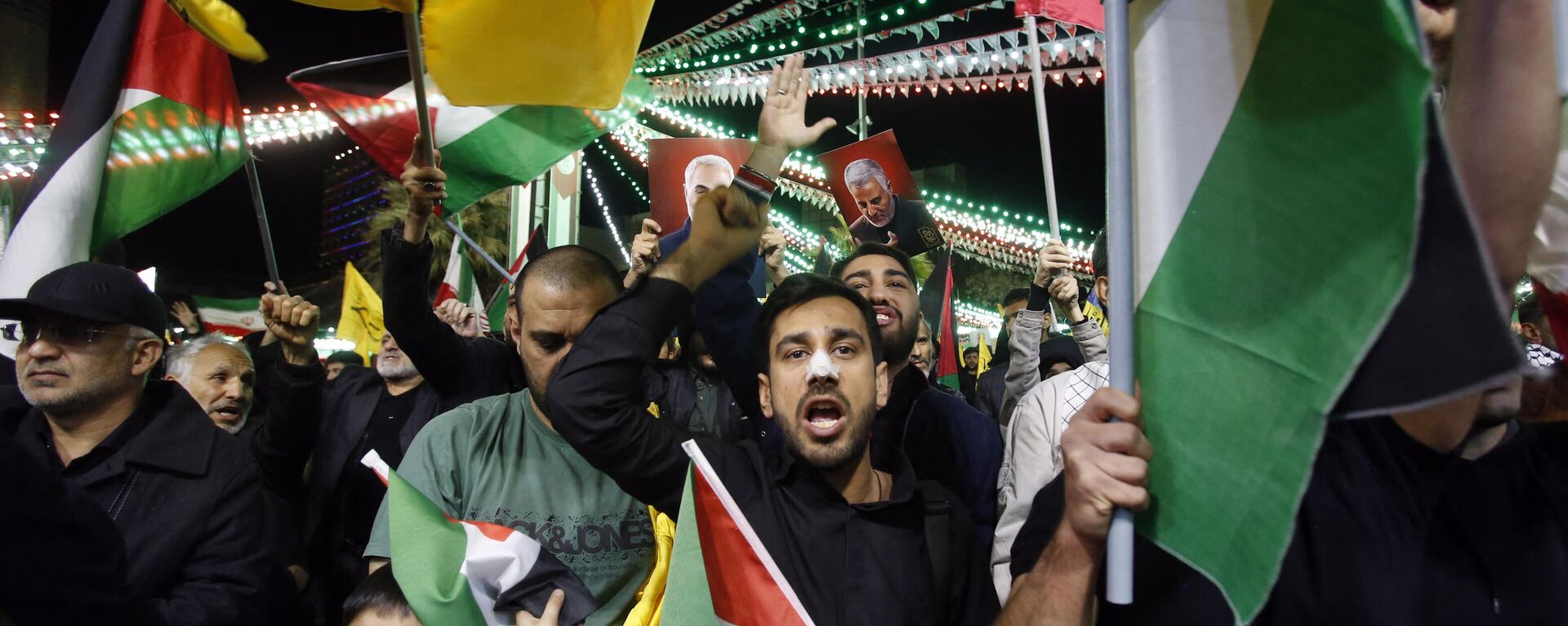https://sputnikglobe.com/20240404/how-iran-can-avoid-falling-into-netanyahus-trap-as-israel-escalates-shadow-war-1117741166.html
How Iran Can Avoid Falling Into Netanyahu’s Trap as Israel Escalates ‘Shadow War’
How Iran Can Avoid Falling Into Netanyahu’s Trap as Israel Escalates ‘Shadow War’
Sputnik International
Tel Aviv dramatically escalated its covert war against Iran on Monday, targeting the consulate annex to the Islamic Republic’s Damascus Embassy in a missile strike. Three days later, an al-Qaeda-linked* terror group with suspected ties to Mossad struck police stations in southeastern Iran. Can an all-out war between the regional powers be avoided?
2024-04-04T16:33+0000
2024-04-04T16:33+0000
2024-04-13T12:09+0000
benjamin netanyahu
middle east
ayatollah ali khamenei
iran
israel
tehran
al-qaeda
mossad
islam
analysis
https://cdn1.img.sputnikglobe.com/img/07e8/04/02/1117697107_0:0:3072:1728_1920x0_80_0_0_b4471d0ed6043ca73a141e640d1d86cf.jpg
Supreme Leader Ayatollah Ali Khamenei has warned Israel of impending retaliation for Monday’s aggression against the Iranian Embassy compound in Syria, indicating in a rare Hebrew-language post on X that “with God’s help we will make the Zionists repent of their crime of aggression against the Iranian consulate.”16 people including two civilians were killed in Monday’s missile strike, among them IRGC Brig. Gen. Mohammad Reza Zahedi, a senior Revolutionary Guard Quds Force commander advising the Syrian military in its counterterrorism operations.Russia and China strongly condemned the attack against their Middle Eastern anti-terror ally, while Washington rushed to insist that it had nothing to do with it, pinning the blame squarely on Israel and urging the Islamic Republic not to target US military bases in the region. Israel neither confirmed nor denied its culpability, but has moved to call up additional army reserves, canceled soldier leave and announced a meeting of the security cabinet.Monday’s strike was followed up by run and gun attacks by members of the Jaish al-Adl terrorist group against two police stations in Rask and Chabahar in the southeastern Iranian province of Sistan and Baluchestan on Wednesday night. The al-Qaeda-linked* terrorist and separatist group has waged a decade-long campaign of low-intensity guerrilla warfare against Iran including, bombings, kidnappings and killings of security personnel and civilians, and Iranian officials have repeatedly pointed to the group’s suspected ties to Mossad and Western intelligence services. Five police officers were killed in the Wednesday attack, with the Revolutionary Guards announcing the liquidation of 15 Jaish al-Adl militants.Will Iran Fall Into Netanyahu’s Trap?“I feel quite confident in what Prime Minister Netanyahu is probably aiming,” Dr. Marco Carnelos, an Italian former diplomat and prime ministerial advisor specializing in Middle Eastern affairs, told Sputnik regarding this week’s “highly concerning” escalation of the “shadow war” between Iran and Israel, which he said puts grave pressure on Tehran’s ability to maintain its policy of “strategic patience” vis-à-vis Tel Aviv.“The least that I can say is that Netanyahu is trying to package a trap for Iran, and the latter’s leadership should be smart enough not to fall into it,” Carnelos, who now works as CEO of MC Geopolicy, a Rome-based consultancy, said.Specifically, Carnelos mentioned Netanyahu’s desire to “enlarge” the conflict raging in Gaza into a regional conflagration, thus enabling him to prolong his stay in office, and create “a situation so dangerous that [it] could push the United States to join Israel in the conflict against Iran.”Professor Hossein Askari, professor emeritus at the GW School of Business in Washington, DC, echoed this assessment, emphasizing that the best thing Tehran could do from Netanyahu’s perspective would be to respond in a symmetrical fashion.Israel secretly views most Arab countries “with contempt,” according to the academic, with regional leaders seen as weak, money and luxury-craving figures who pose no real threat to Tel Aviv's agenda. Iran, on the other hand, is genuinely feared, “because of Iran’s history and what Iranians can do,” Askari said, hence the aggression against it.Measured Retaliation“Iran is the only Muslim country in the Middle East that is standing up to the United States and its proxy, Israel. Iran is trying to prove its anti-colonialist credentials to all Muslims and supplant” regional countries “as the defender of Islam and Muslims,” Askari said. At the same time, Tehran “knows full well” that it does not have the military power to guarantee victory over Israel and the US in a direct conflagration, and that it needs to “balance domestic needs and foreign ventures.”Masters of asymmetric warfare, the Iranians have an array of tools available to respond to aggression without provoking an all-out war with Tel Aviv and its US backers.“I think Iran will do a number of things that will hurt Israel and the United States on a continuous basis. Iran will pressure Iraq to expel all US forces and close down their bases in Iraq. Sensing Arab anger against their spineless rulers, the United States and Israel, Iran will support Arab dissidents to attack Israeli and US interests around the world. If Israel can attack an Iranian consulate and the US, France and the UK are okay with that, then Iran will feel free to support Arab dissidents to get revenge for the genocide in Gaza,” Askari predicted.* A terrorist group outlawed in Russia and many other countries.
https://sputnikglobe.com/20240402/russian-intel-chief-calls-israeli-strike-on-iranian-consulate-in-syria-terrorist-attack-1117696341.html
https://sputnikglobe.com/20240402/iran-urges-oic-to-take-action-against-israel-due-to-attack-on-iranian-consulate-1117691397.html
https://sputnikglobe.com/20231023/what-do-we-know-about-the-axis-of-resistance-1114360533.html
iran
israel
tehran
Sputnik International
feedback@sputniknews.com
+74956456601
MIA „Rossiya Segodnya“
2024
News
en_EN
Sputnik International
feedback@sputniknews.com
+74956456601
MIA „Rossiya Segodnya“
Sputnik International
feedback@sputniknews.com
+74956456601
MIA „Rossiya Segodnya“
how will iran respond to israeli aggression, what will iran's next move be amid israeli aggression
how will iran respond to israeli aggression, what will iran's next move be amid israeli aggression
How Iran Can Avoid Falling Into Netanyahu’s Trap as Israel Escalates ‘Shadow War’
16:33 GMT 04.04.2024 (Updated: 12:09 GMT 13.04.2024) Tel Aviv dramatically escalated its covert war against Iran on Monday, targeting the consulate annex to the Islamic Republic’s Damascus Embassy in a missile strike. Three days later, an al-Qaeda-linked* terror group with suspected ties to Mossad struck police stations in southeastern Iran. Can an all-out war between the regional powers be avoided?
Supreme Leader Ayatollah Ali Khamenei has warned Israel of impending retaliation for Monday’s aggression against the Iranian Embassy compound in Syria, indicating in a rare Hebrew-language post on X
that “with God’s help we will make the Zionists repent of their crime of aggression against the Iranian consulate.”
The post complemented remarks by Khamenei on Wednesday that “the cowardly efforts by the Zionist regime like the one they carried out in Syria will not save them from defeat. They will of course receive a slap in the face for this move,” he vowed.
16 people including two civilians were killed in Monday’s missile strike,
among them IRGC Brig. Gen. Mohammad Reza Zahedi, a senior Revolutionary Guard Quds Force commander advising the Syrian military in its counterterrorism operations.
Russia and China
strongly condemned the attack against their Middle Eastern anti-terror ally, while Washington
rushed to insist that it had nothing to do with it,
pinning the blame squarely on Israel and
urging the Islamic Republic not to target US military bases in the region. Israel neither confirmed nor denied its culpability, but has moved to call up additional army reserves,
canceled soldier leave and
announced a meeting of the security cabinet.
Monday’s strike was followed up by
run and gun attacks by members of the Jaish al-Adl terrorist group against two police stations in Rask and Chabahar in the southeastern Iranian province of Sistan and Baluchestan on Wednesday night. The al-Qaeda-linked* terrorist and separatist group has waged a decade-long campaign of low-intensity guerrilla warfare against Iran including, bombings, kidnappings and killings of security personnel and civilians, and Iranian officials have repeatedly pointed to the group’s suspected ties to Mossad and Western intelligence services. Five police officers were killed in the Wednesday attack, with the Revolutionary Guards announcing the liquidation of 15 Jaish al-Adl militants.
Will Iran Fall Into Netanyahu’s Trap?
“I feel quite confident in what Prime Minister Netanyahu is probably aiming,” Dr. Marco Carnelos, an Italian former diplomat and prime ministerial advisor specializing in Middle Eastern affairs, told Sputnik regarding this week’s “highly concerning” escalation of the “shadow war” between Iran and Israel, which he said puts grave pressure on Tehran’s ability to maintain its policy of “strategic patience” vis-à-vis Tel Aviv.
“The least that I can say is that Netanyahu is trying to package a trap for Iran, and the latter’s leadership should be smart enough not to fall into it,” Carnelos, who now works as CEO of MC Geopolicy, a Rome-based consultancy, said.
Specifically, Carnelos mentioned Netanyahu’s desire to “enlarge” the conflict raging in Gaza into a regional conflagration, thus enabling him to prolong his stay in office, and create “a situation so dangerous that [it] could push the United States to join Israel in the conflict against Iran.”
“It’s quite difficult to predict what the Iranian leadership might be thinking at this moment,” the observer admitted, noting that his advice is for Tehran to “try to minimize tensions and work tirelessly with its Arab neighbors to show who is really stirring tensions in the region.”
Professor Hossein Askari, professor emeritus at the GW School of Business in Washington, DC, echoed this assessment, emphasizing that the best thing Tehran could do from Netanyahu’s perspective would be to respond in a symmetrical fashion.
“Israel wants Iran to fire missiles into Israeli towns, causing massive carnage. Then it would feel free to use its US 2,000 pound bunker buster bombs on Iran’s nuclear facilities and cities and persuade the US to join in. Netanyahu wants to cause mayhem to stay in power and avoid jail, to destroy Iran as a threat once and for all,” Dr. Askari stressed.
Israel secretly views most Arab countries “with contempt,” according to the academic, with regional leaders seen as weak, money and luxury-craving figures who pose no real threat to Tel Aviv's agenda. Iran, on the other hand, is genuinely feared, “because of Iran’s history and what Iranians can do,” Askari said, hence the aggression against it.
“Iran is the only Muslim country in the Middle East that is standing up to the United States and its proxy, Israel. Iran is trying to prove its anti-colonialist credentials to all Muslims and supplant” regional countries “as the defender of Islam and Muslims,” Askari said. At the same time, Tehran “knows full well” that it does not have the military power to guarantee victory over Israel and the US in a direct conflagration, and that it needs to “balance domestic needs and foreign ventures.”
Masters of asymmetric warfare, the Iranians have an array of tools available to respond to aggression without provoking an all-out war with Tel Aviv and its US backers.
“When all is said and done with the Gaza war and the full horrors of the Israeli-American carnage are revealed, Iran could be seen as standing up against imperial powers while Arab rulers will be totally disgraced. So Iran has to support its [allies] in the region and retaliate in some meaningful way against Israel and the United States,” the professor explained, saying this could be done, for example, via cyberattacks inside Israel, and/or tit-for-tat attacks targeting Israeli interests around the world.
“I think Iran will do a number of things that will hurt Israel and the United States on a continuous basis. Iran will pressure Iraq to expel all US forces and close down their bases in Iraq. Sensing Arab anger against their spineless rulers, the United States and Israel, Iran will support Arab dissidents to attack Israeli and US interests around the world. If Israel can attack an Iranian consulate and the US, France and the UK are okay with that, then Iran will feel free to support Arab dissidents to get revenge for the genocide in Gaza,” Askari predicted.

23 October 2023, 17:38 GMT
* A terrorist group outlawed in Russia and many other countries.





